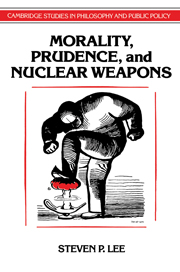2 - The moral problem
Published online by Cambridge University Press: 06 July 2010
Summary
Nuclear weapons create a fundamental problem for our moral understanding. The condition of mutual vulnerability calls into question some basic features of our moral view. The fantastic destructive power of nuclear weapons seems to place them beyond our moral world, whereas their presence in our hands makes them inescapably part of that world. One aspect of the moral problem is the conflict nuclear weapons create between institutional morality and prudence and the resulting political marginalization of morality. But the moral problem goes deeper. Nuclear weapons appear to create a sharp conflict not only between morality and prudence, but within morality itself. Beyond forcing a choice between morality and prudence, they seem to confound moral choice itself.
The sharp conflict between morality and prudence implied by the institutional norms might be shown not to hold if appeal is made to a moral perspective broader than that of the just-war tradition. The way in which we reason about moral matters in everyday life, outside the context of particular social institutions and their special moral norms, provides a broader perspective. I will refer to this perspective as everyday moral reasoning. Everyday moral reasoning is pluralistic, in the sense that it recognizes different, often conflicting, approaches to assessing the moral status of actions or policies. The just-war tradition is not pluralistic in the same way.
- Type
- Chapter
- Information
- Morality, Prudence, and Nuclear Weapons , pp. 34 - 81Publisher: Cambridge University PressPrint publication year: 1993

